Legal Regulation of Business Structures: Corporation Act 2001 Report
VerifiedAdded on 2020/12/23
|11
|3560
|192
Report
AI Summary
This report provides a detailed analysis of the legal regulations governing business structures, focusing on the Corporation Act 2001 and relevant case law. The report examines two specific cases: the alteration of a company's constitution and the civil obligations of directors. In the first case, the report analyzes the validity of a special resolution to alter the articles of association, highlighting the importance of proper notice and fairness to minority shareholders, referencing the Gambotto case. The second case explores the directors' duties related to civil obligations, specifically the good faith requirement, and the misuse of position and information, analyzing the consequences of transferring profitable business assets to a new company to protect the director's interests. The report concludes with an assessment of the legal implications of the actions taken by the parties involved, including potential remedies and penalties under the Corporation Act.
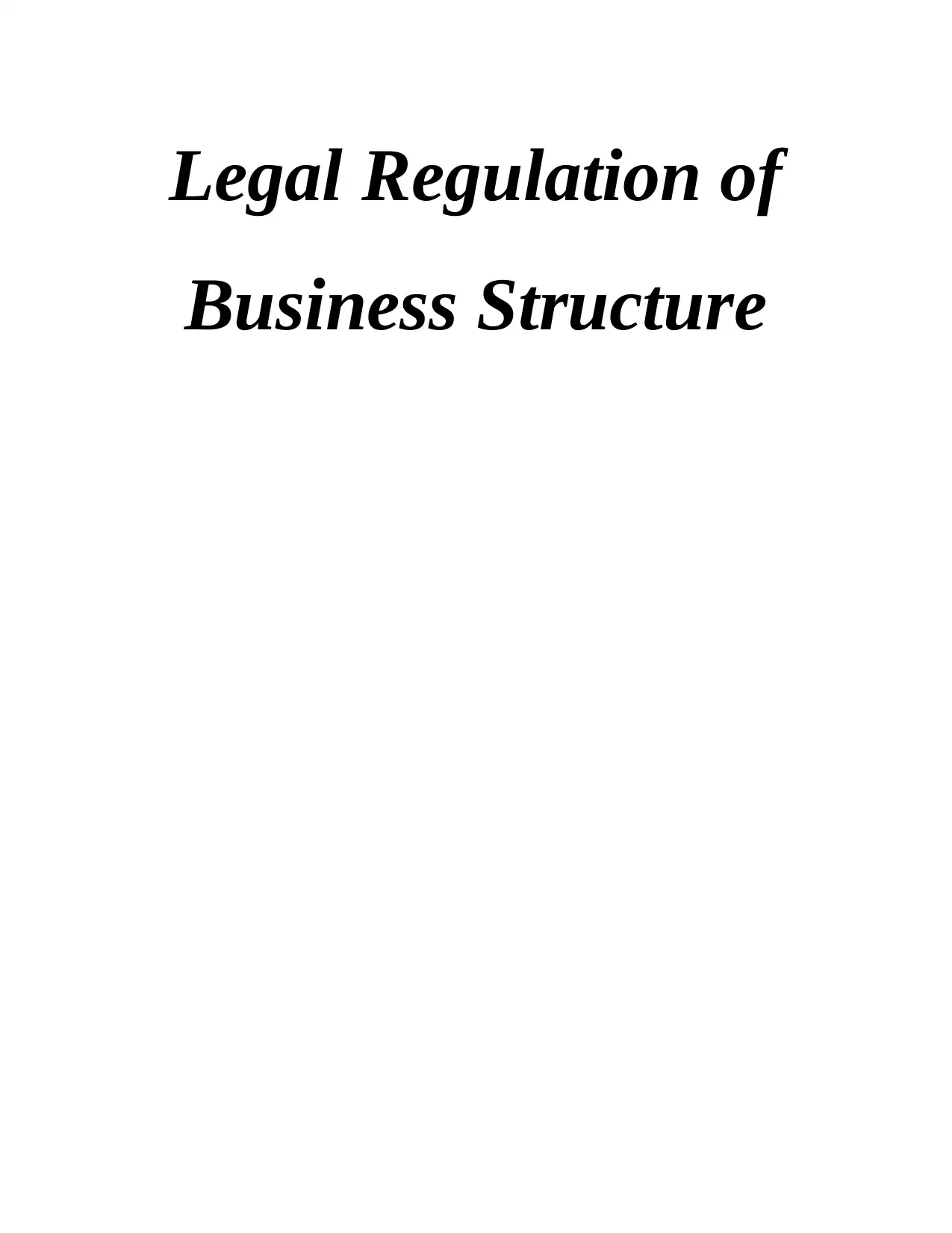
Legal Regulation of
Business Structure
Business Structure
Paraphrase This Document
Need a fresh take? Get an instant paraphrase of this document with our AI Paraphraser

TABLE OF CONTENTS
INTRODUCTION...........................................................................................................................1
QUESTION 1...................................................................................................................................1
QUESTION 2...................................................................................................................................4
REFERENCES................................................................................................................................9
INTRODUCTION...........................................................................................................................1
QUESTION 1...................................................................................................................................1
QUESTION 2...................................................................................................................................4
REFERENCES................................................................................................................................9
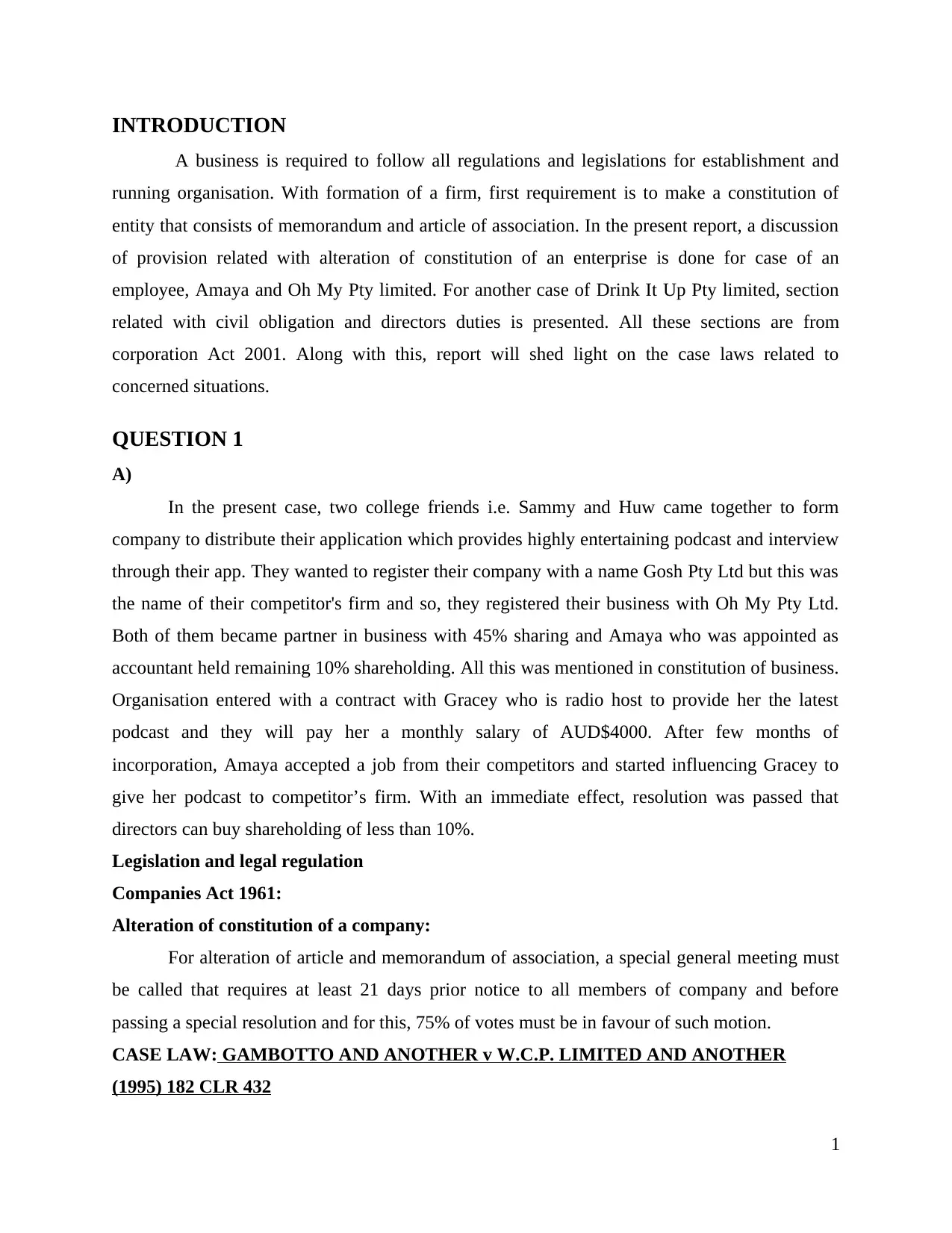
INTRODUCTION
A business is required to follow all regulations and legislations for establishment and
running organisation. With formation of a firm, first requirement is to make a constitution of
entity that consists of memorandum and article of association. In the present report, a discussion
of provision related with alteration of constitution of an enterprise is done for case of an
employee, Amaya and Oh My Pty limited. For another case of Drink It Up Pty limited, section
related with civil obligation and directors duties is presented. All these sections are from
corporation Act 2001. Along with this, report will shed light on the case laws related to
concerned situations.
QUESTION 1
A)
In the present case, two college friends i.e. Sammy and Huw came together to form
company to distribute their application which provides highly entertaining podcast and interview
through their app. They wanted to register their company with a name Gosh Pty Ltd but this was
the name of their competitor's firm and so, they registered their business with Oh My Pty Ltd.
Both of them became partner in business with 45% sharing and Amaya who was appointed as
accountant held remaining 10% shareholding. All this was mentioned in constitution of business.
Organisation entered with a contract with Gracey who is radio host to provide her the latest
podcast and they will pay her a monthly salary of AUD$4000. After few months of
incorporation, Amaya accepted a job from their competitors and started influencing Gracey to
give her podcast to competitor’s firm. With an immediate effect, resolution was passed that
directors can buy shareholding of less than 10%.
Legislation and legal regulation
Companies Act 1961:
Alteration of constitution of a company:
For alteration of article and memorandum of association, a special general meeting must
be called that requires at least 21 days prior notice to all members of company and before
passing a special resolution and for this, 75% of votes must be in favour of such motion.
CASE LAW: GAMBOTTO AND ANOTHER v W.C.P. LIMITED AND ANOTHER
(1995) 182 CLR 432
1
A business is required to follow all regulations and legislations for establishment and
running organisation. With formation of a firm, first requirement is to make a constitution of
entity that consists of memorandum and article of association. In the present report, a discussion
of provision related with alteration of constitution of an enterprise is done for case of an
employee, Amaya and Oh My Pty limited. For another case of Drink It Up Pty limited, section
related with civil obligation and directors duties is presented. All these sections are from
corporation Act 2001. Along with this, report will shed light on the case laws related to
concerned situations.
QUESTION 1
A)
In the present case, two college friends i.e. Sammy and Huw came together to form
company to distribute their application which provides highly entertaining podcast and interview
through their app. They wanted to register their company with a name Gosh Pty Ltd but this was
the name of their competitor's firm and so, they registered their business with Oh My Pty Ltd.
Both of them became partner in business with 45% sharing and Amaya who was appointed as
accountant held remaining 10% shareholding. All this was mentioned in constitution of business.
Organisation entered with a contract with Gracey who is radio host to provide her the latest
podcast and they will pay her a monthly salary of AUD$4000. After few months of
incorporation, Amaya accepted a job from their competitors and started influencing Gracey to
give her podcast to competitor’s firm. With an immediate effect, resolution was passed that
directors can buy shareholding of less than 10%.
Legislation and legal regulation
Companies Act 1961:
Alteration of constitution of a company:
For alteration of article and memorandum of association, a special general meeting must
be called that requires at least 21 days prior notice to all members of company and before
passing a special resolution and for this, 75% of votes must be in favour of such motion.
CASE LAW: GAMBOTTO AND ANOTHER v W.C.P. LIMITED AND ANOTHER
(1995) 182 CLR 432
1
⊘ This is a preview!⊘
Do you want full access?
Subscribe today to unlock all pages.

Trusted by 1+ million students worldwide
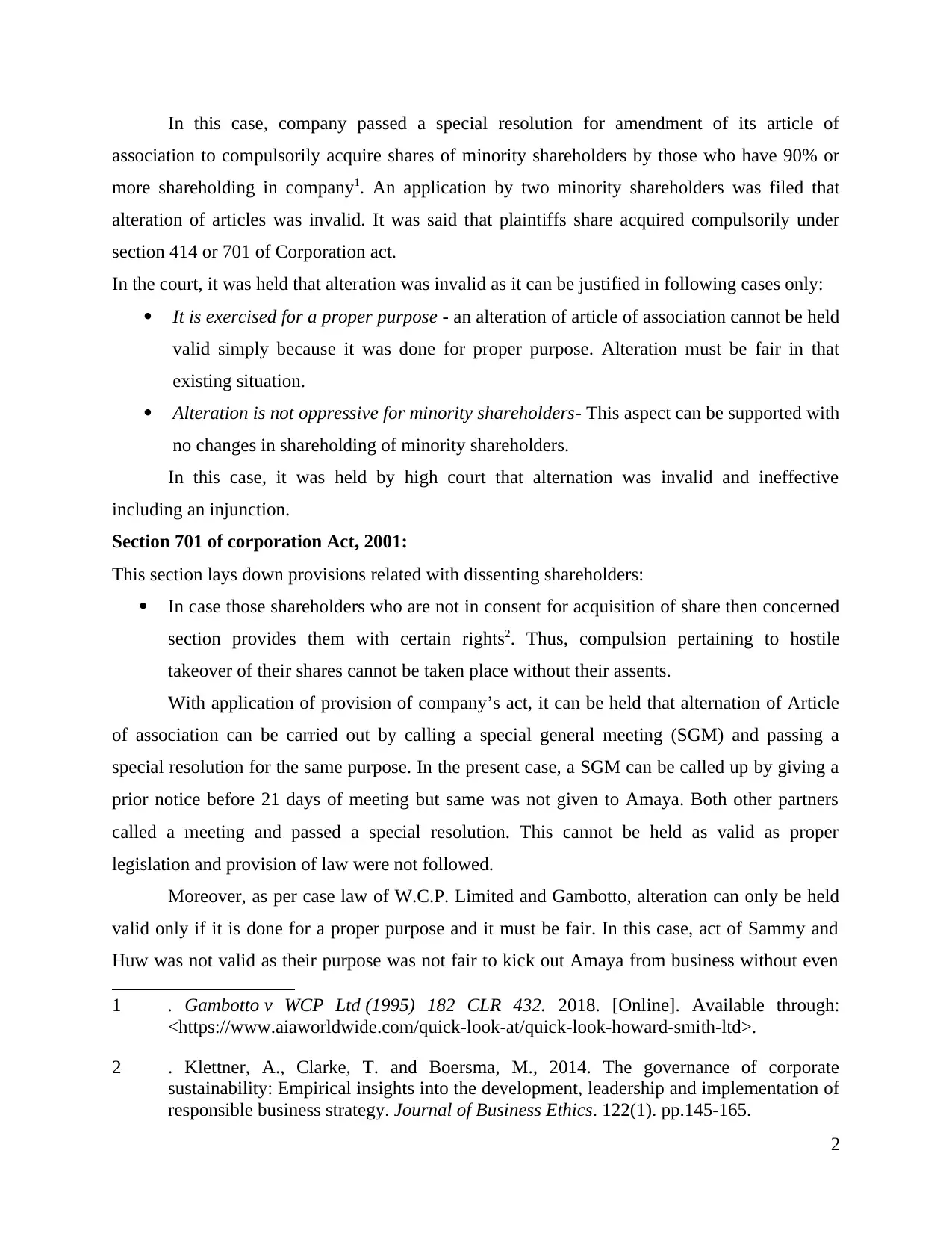
In this case, company passed a special resolution for amendment of its article of
association to compulsorily acquire shares of minority shareholders by those who have 90% or
more shareholding in company1. An application by two minority shareholders was filed that
alteration of articles was invalid. It was said that plaintiffs share acquired compulsorily under
section 414 or 701 of Corporation act.
In the court, it was held that alteration was invalid as it can be justified in following cases only:
It is exercised for a proper purpose - an alteration of article of association cannot be held
valid simply because it was done for proper purpose. Alteration must be fair in that
existing situation.
Alteration is not oppressive for minority shareholders- This aspect can be supported with
no changes in shareholding of minority shareholders.
In this case, it was held by high court that alternation was invalid and ineffective
including an injunction.
Section 701 of corporation Act, 2001:
This section lays down provisions related with dissenting shareholders:
In case those shareholders who are not in consent for acquisition of share then concerned
section provides them with certain rights2. Thus, compulsion pertaining to hostile
takeover of their shares cannot be taken place without their assents.
With application of provision of company’s act, it can be held that alternation of Article
of association can be carried out by calling a special general meeting (SGM) and passing a
special resolution for the same purpose. In the present case, a SGM can be called up by giving a
prior notice before 21 days of meeting but same was not given to Amaya. Both other partners
called a meeting and passed a special resolution. This cannot be held as valid as proper
legislation and provision of law were not followed.
Moreover, as per case law of W.C.P. Limited and Gambotto, alteration can only be held
valid only if it is done for a proper purpose and it must be fair. In this case, act of Sammy and
Huw was not valid as their purpose was not fair to kick out Amaya from business without even
1 . Gambotto v WCP Ltd (1995) 182 CLR 432. 2018. [Online]. Available through:
<https://www.aiaworldwide.com/quick-look-at/quick-look-howard-smith-ltd>.
2 . Klettner, A., Clarke, T. and Boersma, M., 2014. The governance of corporate
sustainability: Empirical insights into the development, leadership and implementation of
responsible business strategy. Journal of Business Ethics. 122(1). pp.145-165.
2
association to compulsorily acquire shares of minority shareholders by those who have 90% or
more shareholding in company1. An application by two minority shareholders was filed that
alteration of articles was invalid. It was said that plaintiffs share acquired compulsorily under
section 414 or 701 of Corporation act.
In the court, it was held that alteration was invalid as it can be justified in following cases only:
It is exercised for a proper purpose - an alteration of article of association cannot be held
valid simply because it was done for proper purpose. Alteration must be fair in that
existing situation.
Alteration is not oppressive for minority shareholders- This aspect can be supported with
no changes in shareholding of minority shareholders.
In this case, it was held by high court that alternation was invalid and ineffective
including an injunction.
Section 701 of corporation Act, 2001:
This section lays down provisions related with dissenting shareholders:
In case those shareholders who are not in consent for acquisition of share then concerned
section provides them with certain rights2. Thus, compulsion pertaining to hostile
takeover of their shares cannot be taken place without their assents.
With application of provision of company’s act, it can be held that alternation of Article
of association can be carried out by calling a special general meeting (SGM) and passing a
special resolution for the same purpose. In the present case, a SGM can be called up by giving a
prior notice before 21 days of meeting but same was not given to Amaya. Both other partners
called a meeting and passed a special resolution. This cannot be held as valid as proper
legislation and provision of law were not followed.
Moreover, as per case law of W.C.P. Limited and Gambotto, alteration can only be held
valid only if it is done for a proper purpose and it must be fair. In this case, act of Sammy and
Huw was not valid as their purpose was not fair to kick out Amaya from business without even
1 . Gambotto v WCP Ltd (1995) 182 CLR 432. 2018. [Online]. Available through:
<https://www.aiaworldwide.com/quick-look-at/quick-look-howard-smith-ltd>.
2 . Klettner, A., Clarke, T. and Boersma, M., 2014. The governance of corporate
sustainability: Empirical insights into the development, leadership and implementation of
responsible business strategy. Journal of Business Ethics. 122(1). pp.145-165.
2
Paraphrase This Document
Need a fresh take? Get an instant paraphrase of this document with our AI Paraphraser
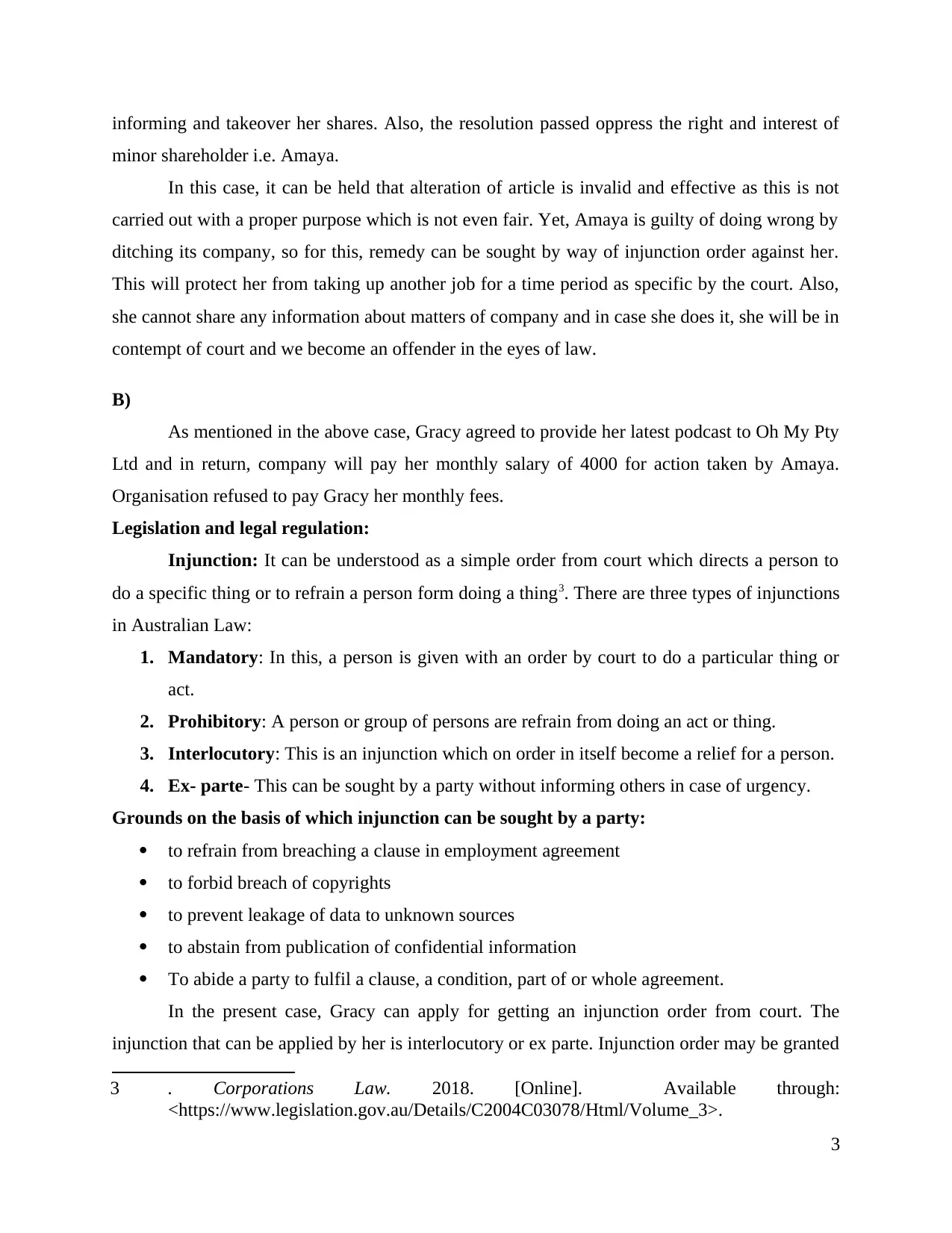
informing and takeover her shares. Also, the resolution passed oppress the right and interest of
minor shareholder i.e. Amaya.
In this case, it can be held that alteration of article is invalid and effective as this is not
carried out with a proper purpose which is not even fair. Yet, Amaya is guilty of doing wrong by
ditching its company, so for this, remedy can be sought by way of injunction order against her.
This will protect her from taking up another job for a time period as specific by the court. Also,
she cannot share any information about matters of company and in case she does it, she will be in
contempt of court and we become an offender in the eyes of law.
B)
As mentioned in the above case, Gracy agreed to provide her latest podcast to Oh My Pty
Ltd and in return, company will pay her monthly salary of 4000 for action taken by Amaya.
Organisation refused to pay Gracy her monthly fees.
Legislation and legal regulation:
Injunction: It can be understood as a simple order from court which directs a person to
do a specific thing or to refrain a person form doing a thing3. There are three types of injunctions
in Australian Law:
1. Mandatory: In this, a person is given with an order by court to do a particular thing or
act.
2. Prohibitory: A person or group of persons are refrain from doing an act or thing.
3. Interlocutory: This is an injunction which on order in itself become a relief for a person.
4. Ex- parte- This can be sought by a party without informing others in case of urgency.
Grounds on the basis of which injunction can be sought by a party:
to refrain from breaching a clause in employment agreement
to forbid breach of copyrights
to prevent leakage of data to unknown sources
to abstain from publication of confidential information
To abide a party to fulfil a clause, a condition, part of or whole agreement.
In the present case, Gracy can apply for getting an injunction order from court. The
injunction that can be applied by her is interlocutory or ex parte. Injunction order may be granted
3 . Corporations Law. 2018. [Online]. Available through:
<https://www.legislation.gov.au/Details/C2004C03078/Html/Volume_3>.
3
minor shareholder i.e. Amaya.
In this case, it can be held that alteration of article is invalid and effective as this is not
carried out with a proper purpose which is not even fair. Yet, Amaya is guilty of doing wrong by
ditching its company, so for this, remedy can be sought by way of injunction order against her.
This will protect her from taking up another job for a time period as specific by the court. Also,
she cannot share any information about matters of company and in case she does it, she will be in
contempt of court and we become an offender in the eyes of law.
B)
As mentioned in the above case, Gracy agreed to provide her latest podcast to Oh My Pty
Ltd and in return, company will pay her monthly salary of 4000 for action taken by Amaya.
Organisation refused to pay Gracy her monthly fees.
Legislation and legal regulation:
Injunction: It can be understood as a simple order from court which directs a person to
do a specific thing or to refrain a person form doing a thing3. There are three types of injunctions
in Australian Law:
1. Mandatory: In this, a person is given with an order by court to do a particular thing or
act.
2. Prohibitory: A person or group of persons are refrain from doing an act or thing.
3. Interlocutory: This is an injunction which on order in itself become a relief for a person.
4. Ex- parte- This can be sought by a party without informing others in case of urgency.
Grounds on the basis of which injunction can be sought by a party:
to refrain from breaching a clause in employment agreement
to forbid breach of copyrights
to prevent leakage of data to unknown sources
to abstain from publication of confidential information
To abide a party to fulfil a clause, a condition, part of or whole agreement.
In the present case, Gracy can apply for getting an injunction order from court. The
injunction that can be applied by her is interlocutory or ex parte. Injunction order may be granted
3 . Corporations Law. 2018. [Online]. Available through:
<https://www.legislation.gov.au/Details/C2004C03078/Html/Volume_3>.
3
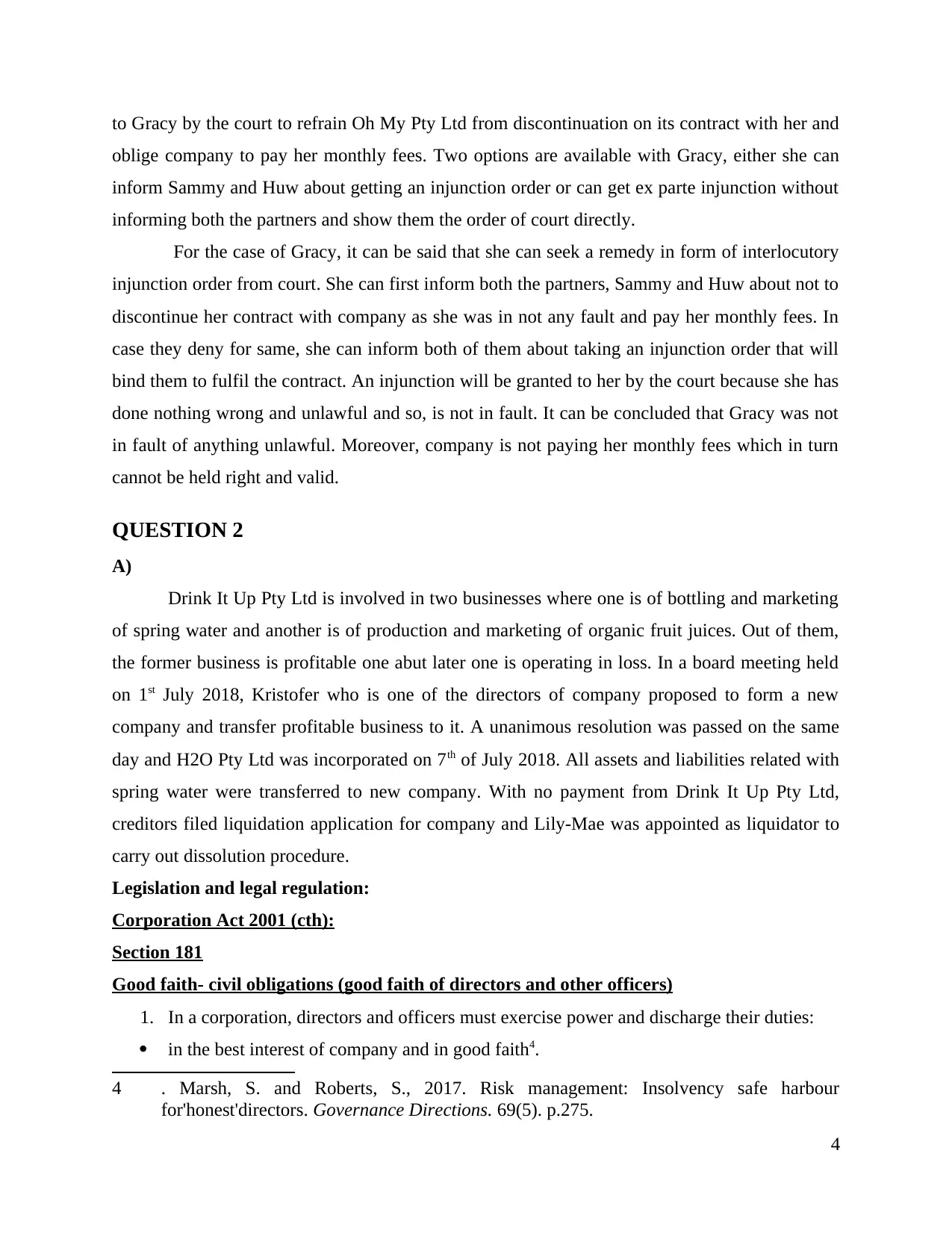
to Gracy by the court to refrain Oh My Pty Ltd from discontinuation on its contract with her and
oblige company to pay her monthly fees. Two options are available with Gracy, either she can
inform Sammy and Huw about getting an injunction order or can get ex parte injunction without
informing both the partners and show them the order of court directly.
For the case of Gracy, it can be said that she can seek a remedy in form of interlocutory
injunction order from court. She can first inform both the partners, Sammy and Huw about not to
discontinue her contract with company as she was in not any fault and pay her monthly fees. In
case they deny for same, she can inform both of them about taking an injunction order that will
bind them to fulfil the contract. An injunction will be granted to her by the court because she has
done nothing wrong and unlawful and so, is not in fault. It can be concluded that Gracy was not
in fault of anything unlawful. Moreover, company is not paying her monthly fees which in turn
cannot be held right and valid.
QUESTION 2
A)
Drink It Up Pty Ltd is involved in two businesses where one is of bottling and marketing
of spring water and another is of production and marketing of organic fruit juices. Out of them,
the former business is profitable one abut later one is operating in loss. In a board meeting held
on 1st July 2018, Kristofer who is one of the directors of company proposed to form a new
company and transfer profitable business to it. A unanimous resolution was passed on the same
day and H2O Pty Ltd was incorporated on 7th of July 2018. All assets and liabilities related with
spring water were transferred to new company. With no payment from Drink It Up Pty Ltd,
creditors filed liquidation application for company and Lily-Mae was appointed as liquidator to
carry out dissolution procedure.
Legislation and legal regulation:
Corporation Act 2001 (cth):
Section 181
Good faith- civil obligations (good faith of directors and other officers)
1. In a corporation, directors and officers must exercise power and discharge their duties:
in the best interest of company and in good faith4.
4 . Marsh, S. and Roberts, S., 2017. Risk management: Insolvency safe harbour
for'honest'directors. Governance Directions. 69(5). p.275.
4
oblige company to pay her monthly fees. Two options are available with Gracy, either she can
inform Sammy and Huw about getting an injunction order or can get ex parte injunction without
informing both the partners and show them the order of court directly.
For the case of Gracy, it can be said that she can seek a remedy in form of interlocutory
injunction order from court. She can first inform both the partners, Sammy and Huw about not to
discontinue her contract with company as she was in not any fault and pay her monthly fees. In
case they deny for same, she can inform both of them about taking an injunction order that will
bind them to fulfil the contract. An injunction will be granted to her by the court because she has
done nothing wrong and unlawful and so, is not in fault. It can be concluded that Gracy was not
in fault of anything unlawful. Moreover, company is not paying her monthly fees which in turn
cannot be held right and valid.
QUESTION 2
A)
Drink It Up Pty Ltd is involved in two businesses where one is of bottling and marketing
of spring water and another is of production and marketing of organic fruit juices. Out of them,
the former business is profitable one abut later one is operating in loss. In a board meeting held
on 1st July 2018, Kristofer who is one of the directors of company proposed to form a new
company and transfer profitable business to it. A unanimous resolution was passed on the same
day and H2O Pty Ltd was incorporated on 7th of July 2018. All assets and liabilities related with
spring water were transferred to new company. With no payment from Drink It Up Pty Ltd,
creditors filed liquidation application for company and Lily-Mae was appointed as liquidator to
carry out dissolution procedure.
Legislation and legal regulation:
Corporation Act 2001 (cth):
Section 181
Good faith- civil obligations (good faith of directors and other officers)
1. In a corporation, directors and officers must exercise power and discharge their duties:
in the best interest of company and in good faith4.
4 . Marsh, S. and Roberts, S., 2017. Risk management: Insolvency safe harbour
for'honest'directors. Governance Directions. 69(5). p.275.
4
⊘ This is a preview!⊘
Do you want full access?
Subscribe today to unlock all pages.

Trusted by 1+ million students worldwide
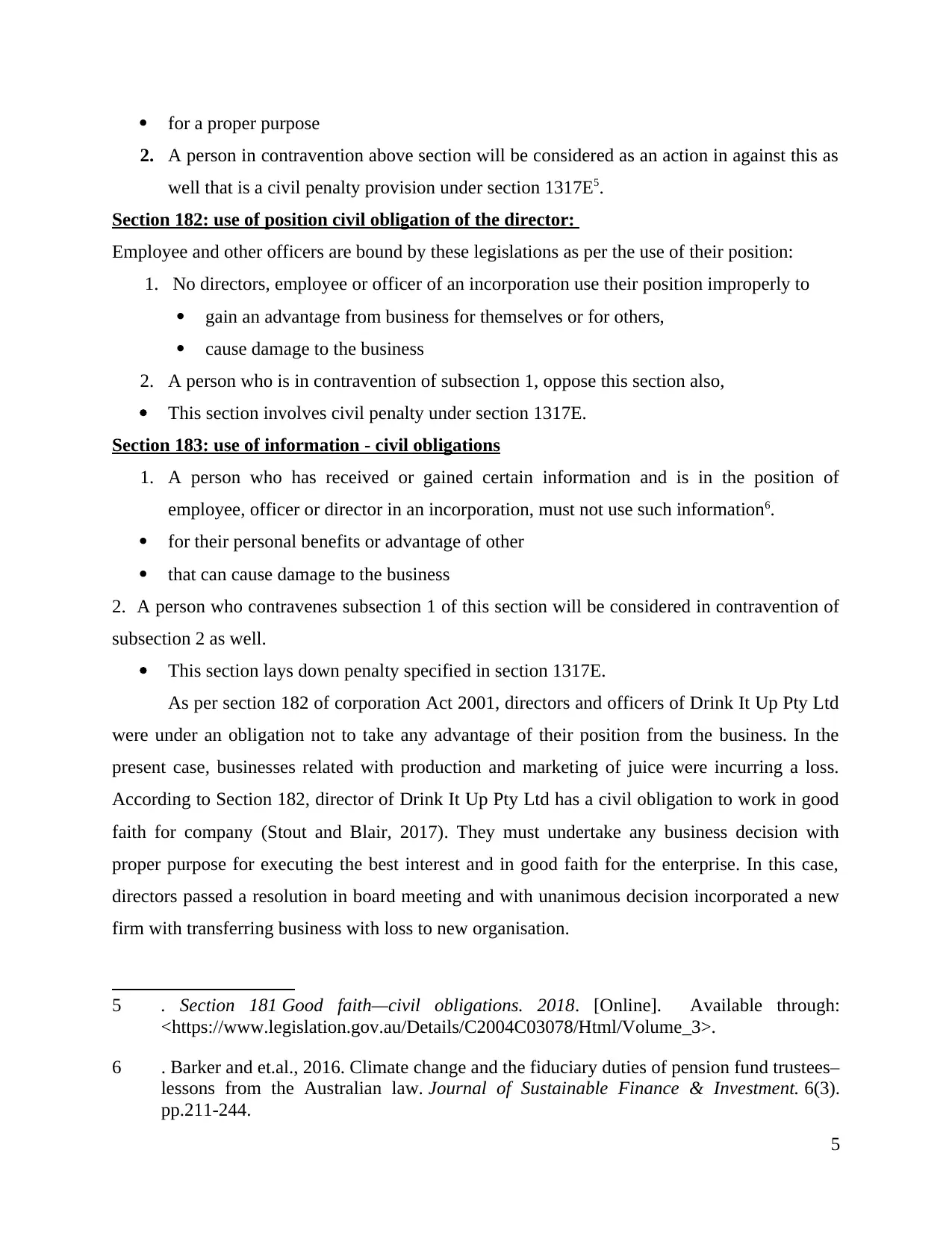
for a proper purpose
2. A person in contravention above section will be considered as an action in against this as
well that is a civil penalty provision under section 1317E5.
Section 182: use of position civil obligation of the director:
Employee and other officers are bound by these legislations as per the use of their position:
1. No directors, employee or officer of an incorporation use their position improperly to
gain an advantage from business for themselves or for others,
cause damage to the business
2. A person who is in contravention of subsection 1, oppose this section also,
This section involves civil penalty under section 1317E.
Section 183: use of information - civil obligations
1. A person who has received or gained certain information and is in the position of
employee, officer or director in an incorporation, must not use such information6.
for their personal benefits or advantage of other
that can cause damage to the business
2. A person who contravenes subsection 1 of this section will be considered in contravention of
subsection 2 as well.
This section lays down penalty specified in section 1317E.
As per section 182 of corporation Act 2001, directors and officers of Drink It Up Pty Ltd
were under an obligation not to take any advantage of their position from the business. In the
present case, businesses related with production and marketing of juice were incurring a loss.
According to Section 182, director of Drink It Up Pty Ltd has a civil obligation to work in good
faith for company (Stout and Blair, 2017). They must undertake any business decision with
proper purpose for executing the best interest and in good faith for the enterprise. In this case,
directors passed a resolution in board meeting and with unanimous decision incorporated a new
firm with transferring business with loss to new organisation.
5 . Section 181 Good faith—civil obligations. 2018. [Online]. Available through:
<https://www.legislation.gov.au/Details/C2004C03078/Html/Volume_3>.
6 . Barker and et.al., 2016. Climate change and the fiduciary duties of pension fund trustees–
lessons from the Australian law. Journal of Sustainable Finance & Investment. 6(3).
pp.211-244.
5
2. A person in contravention above section will be considered as an action in against this as
well that is a civil penalty provision under section 1317E5.
Section 182: use of position civil obligation of the director:
Employee and other officers are bound by these legislations as per the use of their position:
1. No directors, employee or officer of an incorporation use their position improperly to
gain an advantage from business for themselves or for others,
cause damage to the business
2. A person who is in contravention of subsection 1, oppose this section also,
This section involves civil penalty under section 1317E.
Section 183: use of information - civil obligations
1. A person who has received or gained certain information and is in the position of
employee, officer or director in an incorporation, must not use such information6.
for their personal benefits or advantage of other
that can cause damage to the business
2. A person who contravenes subsection 1 of this section will be considered in contravention of
subsection 2 as well.
This section lays down penalty specified in section 1317E.
As per section 182 of corporation Act 2001, directors and officers of Drink It Up Pty Ltd
were under an obligation not to take any advantage of their position from the business. In the
present case, businesses related with production and marketing of juice were incurring a loss.
According to Section 182, director of Drink It Up Pty Ltd has a civil obligation to work in good
faith for company (Stout and Blair, 2017). They must undertake any business decision with
proper purpose for executing the best interest and in good faith for the enterprise. In this case,
directors passed a resolution in board meeting and with unanimous decision incorporated a new
firm with transferring business with loss to new organisation.
5 . Section 181 Good faith—civil obligations. 2018. [Online]. Available through:
<https://www.legislation.gov.au/Details/C2004C03078/Html/Volume_3>.
6 . Barker and et.al., 2016. Climate change and the fiduciary duties of pension fund trustees–
lessons from the Australian law. Journal of Sustainable Finance & Investment. 6(3).
pp.211-244.
5
Paraphrase This Document
Need a fresh take? Get an instant paraphrase of this document with our AI Paraphraser
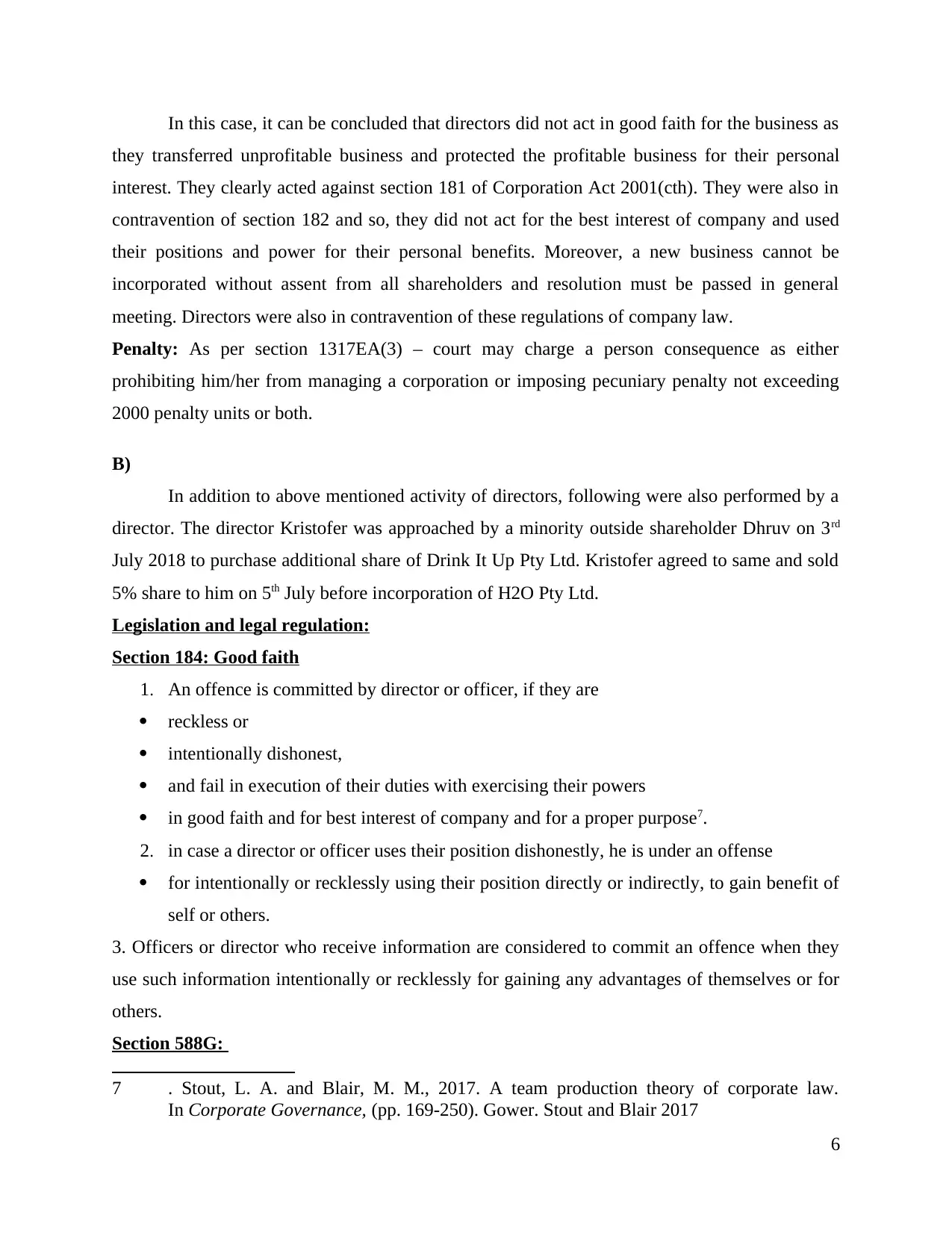
In this case, it can be concluded that directors did not act in good faith for the business as
they transferred unprofitable business and protected the profitable business for their personal
interest. They clearly acted against section 181 of Corporation Act 2001(cth). They were also in
contravention of section 182 and so, they did not act for the best interest of company and used
their positions and power for their personal benefits. Moreover, a new business cannot be
incorporated without assent from all shareholders and resolution must be passed in general
meeting. Directors were also in contravention of these regulations of company law.
Penalty: As per section 1317EA(3) – court may charge a person consequence as either
prohibiting him/her from managing a corporation or imposing pecuniary penalty not exceeding
2000 penalty units or both.
B)
In addition to above mentioned activity of directors, following were also performed by a
director. The director Kristofer was approached by a minority outside shareholder Dhruv on 3rd
July 2018 to purchase additional share of Drink It Up Pty Ltd. Kristofer agreed to same and sold
5% share to him on 5th July before incorporation of H2O Pty Ltd.
Legislation and legal regulation:
Section 184: Good faith
1. An offence is committed by director or officer, if they are
reckless or
intentionally dishonest,
and fail in execution of their duties with exercising their powers
in good faith and for best interest of company and for a proper purpose7.
2. in case a director or officer uses their position dishonestly, he is under an offense
for intentionally or recklessly using their position directly or indirectly, to gain benefit of
self or others.
3. Officers or director who receive information are considered to commit an offence when they
use such information intentionally or recklessly for gaining any advantages of themselves or for
others.
Section 588G:
7 . Stout, L. A. and Blair, M. M., 2017. A team production theory of corporate law.
In Corporate Governance, (pp. 169-250). Gower. Stout and Blair 2017
6
they transferred unprofitable business and protected the profitable business for their personal
interest. They clearly acted against section 181 of Corporation Act 2001(cth). They were also in
contravention of section 182 and so, they did not act for the best interest of company and used
their positions and power for their personal benefits. Moreover, a new business cannot be
incorporated without assent from all shareholders and resolution must be passed in general
meeting. Directors were also in contravention of these regulations of company law.
Penalty: As per section 1317EA(3) – court may charge a person consequence as either
prohibiting him/her from managing a corporation or imposing pecuniary penalty not exceeding
2000 penalty units or both.
B)
In addition to above mentioned activity of directors, following were also performed by a
director. The director Kristofer was approached by a minority outside shareholder Dhruv on 3rd
July 2018 to purchase additional share of Drink It Up Pty Ltd. Kristofer agreed to same and sold
5% share to him on 5th July before incorporation of H2O Pty Ltd.
Legislation and legal regulation:
Section 184: Good faith
1. An offence is committed by director or officer, if they are
reckless or
intentionally dishonest,
and fail in execution of their duties with exercising their powers
in good faith and for best interest of company and for a proper purpose7.
2. in case a director or officer uses their position dishonestly, he is under an offense
for intentionally or recklessly using their position directly or indirectly, to gain benefit of
self or others.
3. Officers or director who receive information are considered to commit an offence when they
use such information intentionally or recklessly for gaining any advantages of themselves or for
others.
Section 588G:
7 . Stout, L. A. and Blair, M. M., 2017. A team production theory of corporate law.
In Corporate Governance, (pp. 169-250). Gower. Stout and Blair 2017
6
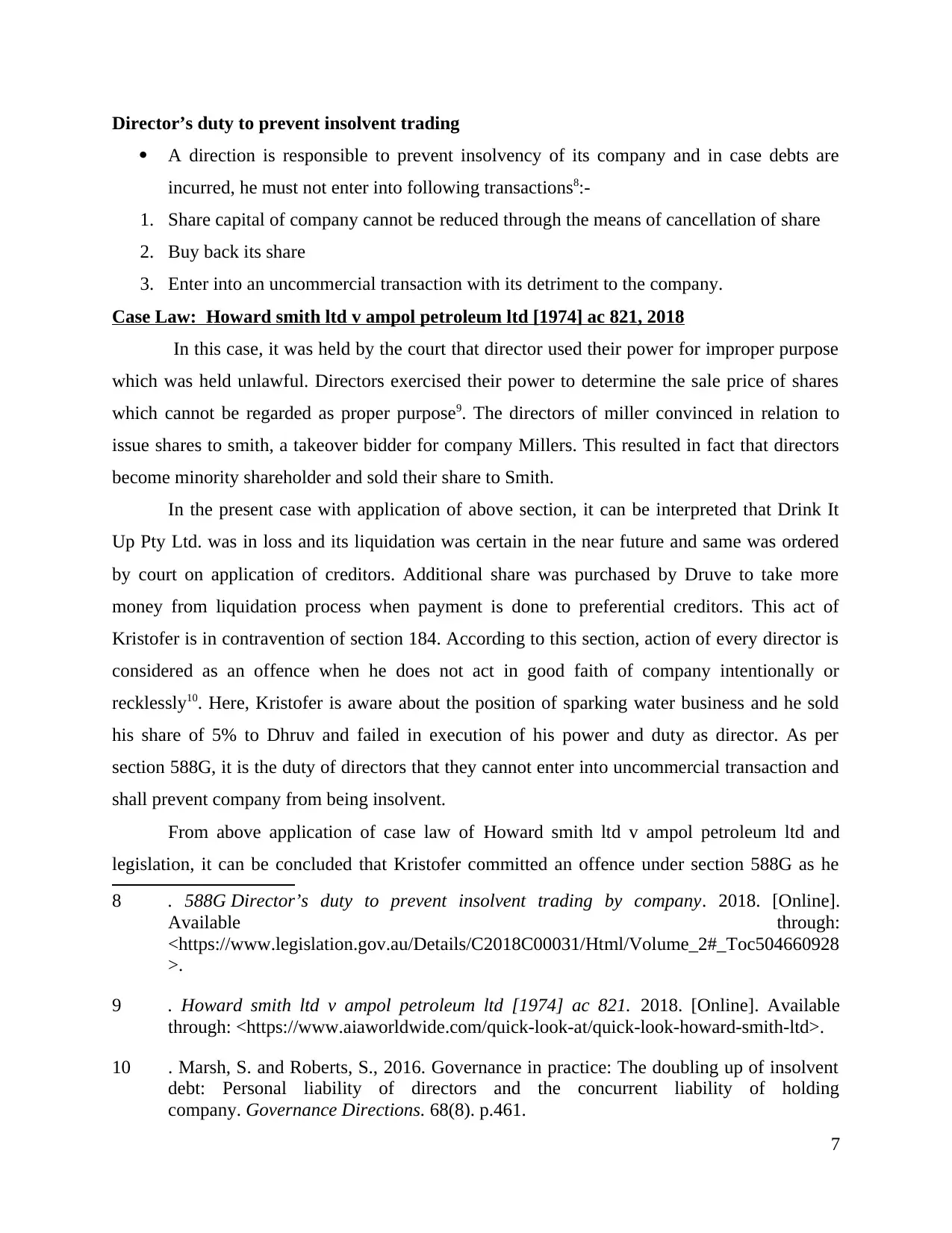
Director’s duty to prevent insolvent trading
A direction is responsible to prevent insolvency of its company and in case debts are
incurred, he must not enter into following transactions8:-
1. Share capital of company cannot be reduced through the means of cancellation of share
2. Buy back its share
3. Enter into an uncommercial transaction with its detriment to the company.
Case Law: Howard smith ltd v ampol petroleum ltd [1974] ac 821, 2018
In this case, it was held by the court that director used their power for improper purpose
which was held unlawful. Directors exercised their power to determine the sale price of shares
which cannot be regarded as proper purpose9. The directors of miller convinced in relation to
issue shares to smith, a takeover bidder for company Millers. This resulted in fact that directors
become minority shareholder and sold their share to Smith.
In the present case with application of above section, it can be interpreted that Drink It
Up Pty Ltd. was in loss and its liquidation was certain in the near future and same was ordered
by court on application of creditors. Additional share was purchased by Druve to take more
money from liquidation process when payment is done to preferential creditors. This act of
Kristofer is in contravention of section 184. According to this section, action of every director is
considered as an offence when he does not act in good faith of company intentionally or
recklessly10. Here, Kristofer is aware about the position of sparking water business and he sold
his share of 5% to Dhruv and failed in execution of his power and duty as director. As per
section 588G, it is the duty of directors that they cannot enter into uncommercial transaction and
shall prevent company from being insolvent.
From above application of case law of Howard smith ltd v ampol petroleum ltd and
legislation, it can be concluded that Kristofer committed an offence under section 588G as he
8 . 588G Director’s duty to prevent insolvent trading by company. 2018. [Online].
Available through:
<https://www.legislation.gov.au/Details/C2018C00031/Html/Volume_2#_Toc504660928
>.
9 . Howard smith ltd v ampol petroleum ltd [1974] ac 821. 2018. [Online]. Available
through: <https://www.aiaworldwide.com/quick-look-at/quick-look-howard-smith-ltd>.
10 . Marsh, S. and Roberts, S., 2016. Governance in practice: The doubling up of insolvent
debt: Personal liability of directors and the concurrent liability of holding
company. Governance Directions. 68(8). p.461.
7
A direction is responsible to prevent insolvency of its company and in case debts are
incurred, he must not enter into following transactions8:-
1. Share capital of company cannot be reduced through the means of cancellation of share
2. Buy back its share
3. Enter into an uncommercial transaction with its detriment to the company.
Case Law: Howard smith ltd v ampol petroleum ltd [1974] ac 821, 2018
In this case, it was held by the court that director used their power for improper purpose
which was held unlawful. Directors exercised their power to determine the sale price of shares
which cannot be regarded as proper purpose9. The directors of miller convinced in relation to
issue shares to smith, a takeover bidder for company Millers. This resulted in fact that directors
become minority shareholder and sold their share to Smith.
In the present case with application of above section, it can be interpreted that Drink It
Up Pty Ltd. was in loss and its liquidation was certain in the near future and same was ordered
by court on application of creditors. Additional share was purchased by Druve to take more
money from liquidation process when payment is done to preferential creditors. This act of
Kristofer is in contravention of section 184. According to this section, action of every director is
considered as an offence when he does not act in good faith of company intentionally or
recklessly10. Here, Kristofer is aware about the position of sparking water business and he sold
his share of 5% to Dhruv and failed in execution of his power and duty as director. As per
section 588G, it is the duty of directors that they cannot enter into uncommercial transaction and
shall prevent company from being insolvent.
From above application of case law of Howard smith ltd v ampol petroleum ltd and
legislation, it can be concluded that Kristofer committed an offence under section 588G as he
8 . 588G Director’s duty to prevent insolvent trading by company. 2018. [Online].
Available through:
<https://www.legislation.gov.au/Details/C2018C00031/Html/Volume_2#_Toc504660928
>.
9 . Howard smith ltd v ampol petroleum ltd [1974] ac 821. 2018. [Online]. Available
through: <https://www.aiaworldwide.com/quick-look-at/quick-look-howard-smith-ltd>.
10 . Marsh, S. and Roberts, S., 2016. Governance in practice: The doubling up of insolvent
debt: Personal liability of directors and the concurrent liability of holding
company. Governance Directions. 68(8). p.461.
7
⊘ This is a preview!⊘
Do you want full access?
Subscribe today to unlock all pages.

Trusted by 1+ million students worldwide
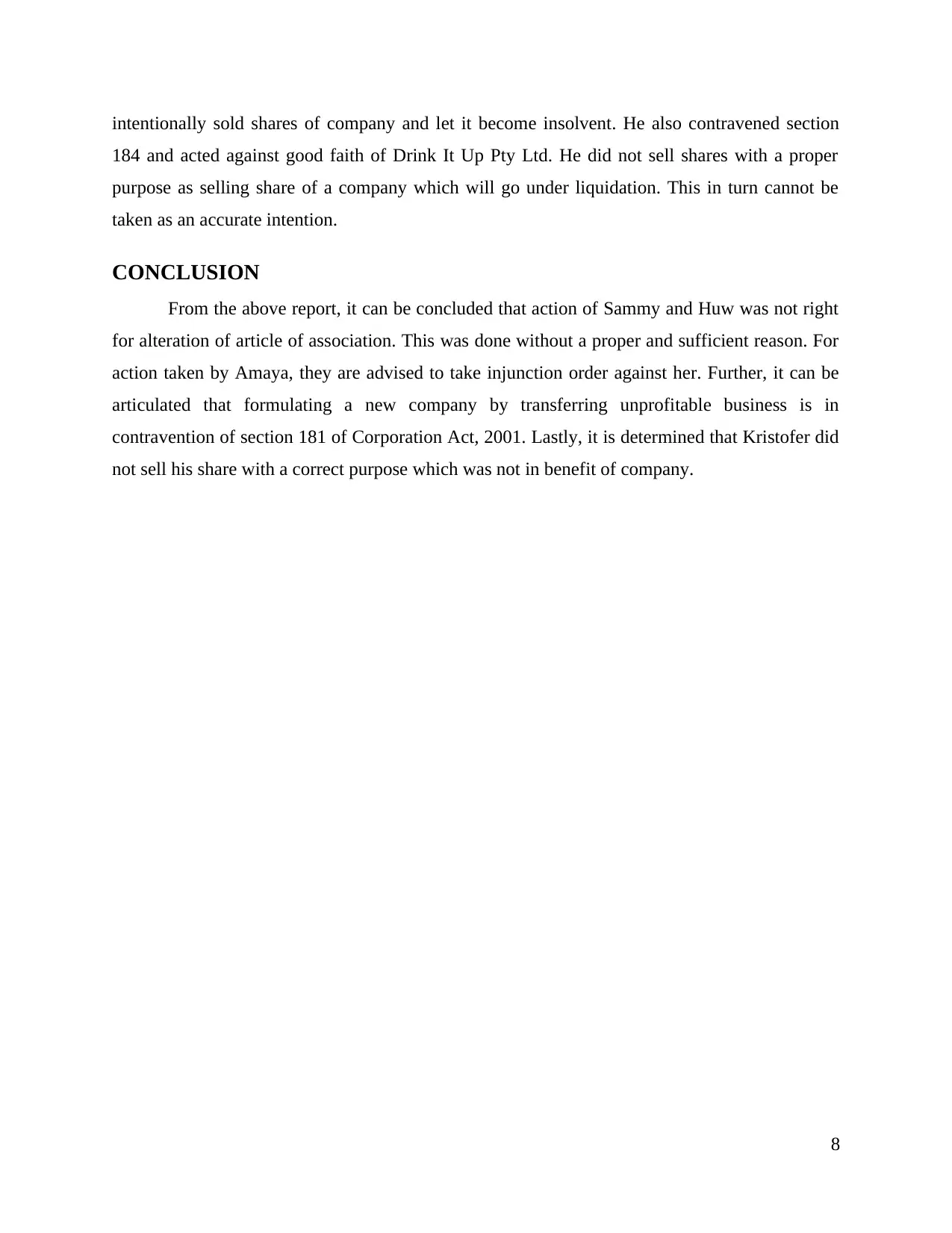
intentionally sold shares of company and let it become insolvent. He also contravened section
184 and acted against good faith of Drink It Up Pty Ltd. He did not sell shares with a proper
purpose as selling share of a company which will go under liquidation. This in turn cannot be
taken as an accurate intention.
CONCLUSION
From the above report, it can be concluded that action of Sammy and Huw was not right
for alteration of article of association. This was done without a proper and sufficient reason. For
action taken by Amaya, they are advised to take injunction order against her. Further, it can be
articulated that formulating a new company by transferring unprofitable business is in
contravention of section 181 of Corporation Act, 2001. Lastly, it is determined that Kristofer did
not sell his share with a correct purpose which was not in benefit of company.
8
184 and acted against good faith of Drink It Up Pty Ltd. He did not sell shares with a proper
purpose as selling share of a company which will go under liquidation. This in turn cannot be
taken as an accurate intention.
CONCLUSION
From the above report, it can be concluded that action of Sammy and Huw was not right
for alteration of article of association. This was done without a proper and sufficient reason. For
action taken by Amaya, they are advised to take injunction order against her. Further, it can be
articulated that formulating a new company by transferring unprofitable business is in
contravention of section 181 of Corporation Act, 2001. Lastly, it is determined that Kristofer did
not sell his share with a correct purpose which was not in benefit of company.
8
Paraphrase This Document
Need a fresh take? Get an instant paraphrase of this document with our AI Paraphraser
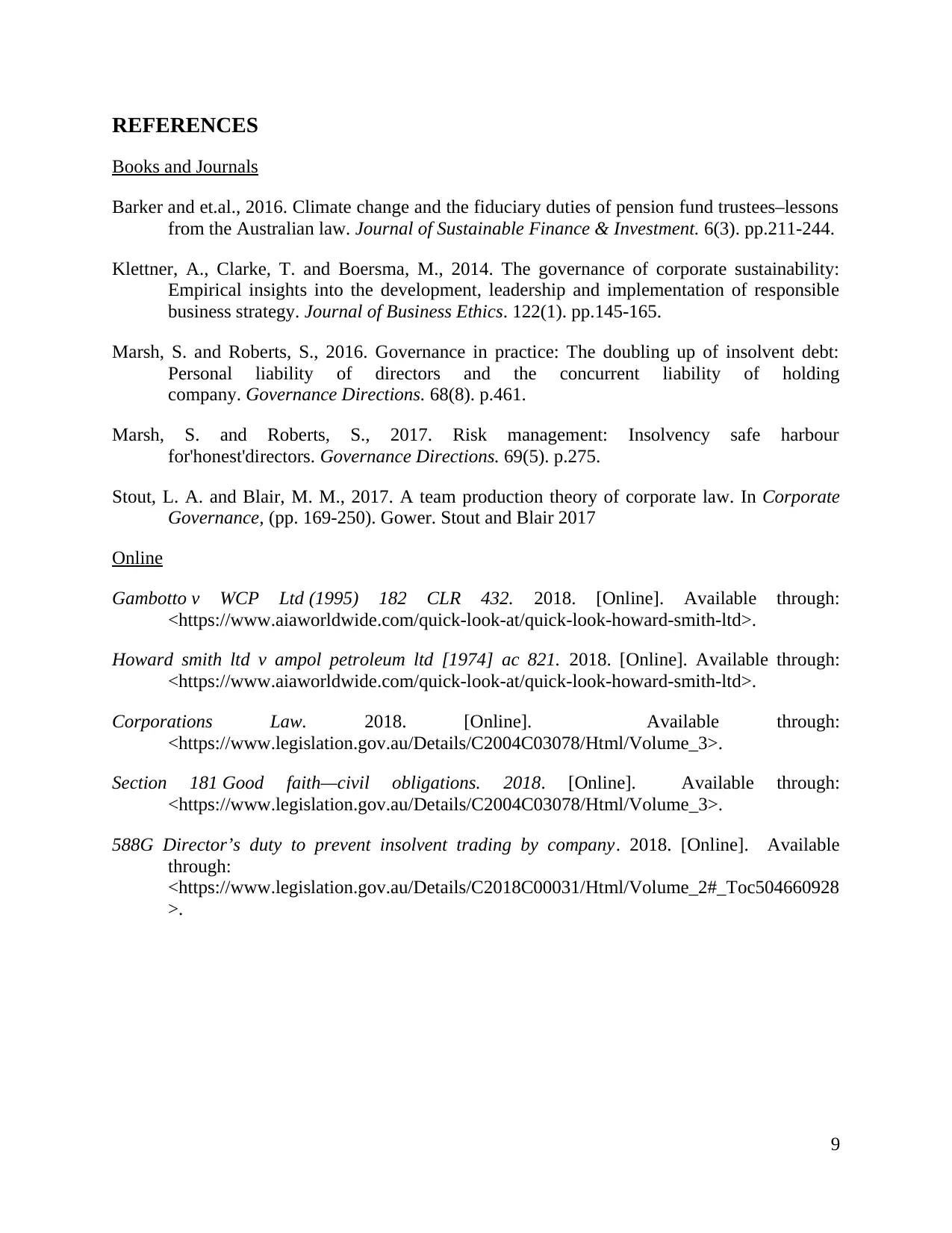
REFERENCES
Books and Journals
Barker and et.al., 2016. Climate change and the fiduciary duties of pension fund trustees–lessons
from the Australian law. Journal of Sustainable Finance & Investment. 6(3). pp.211-244.
Klettner, A., Clarke, T. and Boersma, M., 2014. The governance of corporate sustainability:
Empirical insights into the development, leadership and implementation of responsible
business strategy. Journal of Business Ethics. 122(1). pp.145-165.
Marsh, S. and Roberts, S., 2016. Governance in practice: The doubling up of insolvent debt:
Personal liability of directors and the concurrent liability of holding
company. Governance Directions. 68(8). p.461.
Marsh, S. and Roberts, S., 2017. Risk management: Insolvency safe harbour
for'honest'directors. Governance Directions. 69(5). p.275.
Stout, L. A. and Blair, M. M., 2017. A team production theory of corporate law. In Corporate
Governance, (pp. 169-250). Gower. Stout and Blair 2017
Online
Gambotto v WCP Ltd (1995) 182 CLR 432. 2018. [Online]. Available through:
<https://www.aiaworldwide.com/quick-look-at/quick-look-howard-smith-ltd>.
Howard smith ltd v ampol petroleum ltd [1974] ac 821. 2018. [Online]. Available through:
<https://www.aiaworldwide.com/quick-look-at/quick-look-howard-smith-ltd>.
Corporations Law. 2018. [Online]. Available through:
<https://www.legislation.gov.au/Details/C2004C03078/Html/Volume_3>.
Section 181 Good faith—civil obligations. 2018. [Online]. Available through:
<https://www.legislation.gov.au/Details/C2004C03078/Html/Volume_3>.
588G Director’s duty to prevent insolvent trading by company. 2018. [Online]. Available
through:
<https://www.legislation.gov.au/Details/C2018C00031/Html/Volume_2#_Toc504660928
>.
9
Books and Journals
Barker and et.al., 2016. Climate change and the fiduciary duties of pension fund trustees–lessons
from the Australian law. Journal of Sustainable Finance & Investment. 6(3). pp.211-244.
Klettner, A., Clarke, T. and Boersma, M., 2014. The governance of corporate sustainability:
Empirical insights into the development, leadership and implementation of responsible
business strategy. Journal of Business Ethics. 122(1). pp.145-165.
Marsh, S. and Roberts, S., 2016. Governance in practice: The doubling up of insolvent debt:
Personal liability of directors and the concurrent liability of holding
company. Governance Directions. 68(8). p.461.
Marsh, S. and Roberts, S., 2017. Risk management: Insolvency safe harbour
for'honest'directors. Governance Directions. 69(5). p.275.
Stout, L. A. and Blair, M. M., 2017. A team production theory of corporate law. In Corporate
Governance, (pp. 169-250). Gower. Stout and Blair 2017
Online
Gambotto v WCP Ltd (1995) 182 CLR 432. 2018. [Online]. Available through:
<https://www.aiaworldwide.com/quick-look-at/quick-look-howard-smith-ltd>.
Howard smith ltd v ampol petroleum ltd [1974] ac 821. 2018. [Online]. Available through:
<https://www.aiaworldwide.com/quick-look-at/quick-look-howard-smith-ltd>.
Corporations Law. 2018. [Online]. Available through:
<https://www.legislation.gov.au/Details/C2004C03078/Html/Volume_3>.
Section 181 Good faith—civil obligations. 2018. [Online]. Available through:
<https://www.legislation.gov.au/Details/C2004C03078/Html/Volume_3>.
588G Director’s duty to prevent insolvent trading by company. 2018. [Online]. Available
through:
<https://www.legislation.gov.au/Details/C2018C00031/Html/Volume_2#_Toc504660928
>.
9
1 out of 11
Related Documents
Your All-in-One AI-Powered Toolkit for Academic Success.
+13062052269
info@desklib.com
Available 24*7 on WhatsApp / Email
![[object Object]](/_next/static/media/star-bottom.7253800d.svg)
Unlock your academic potential
Copyright © 2020–2026 A2Z Services. All Rights Reserved. Developed and managed by ZUCOL.



